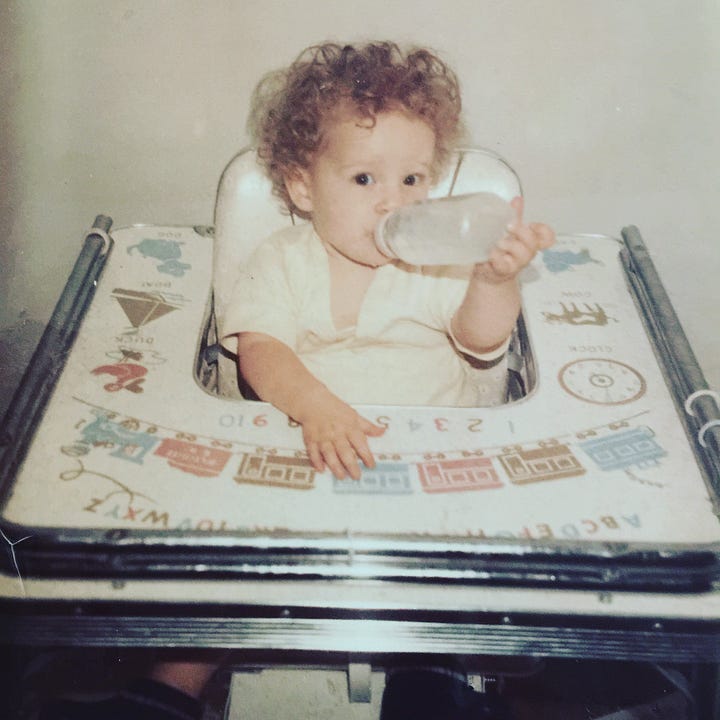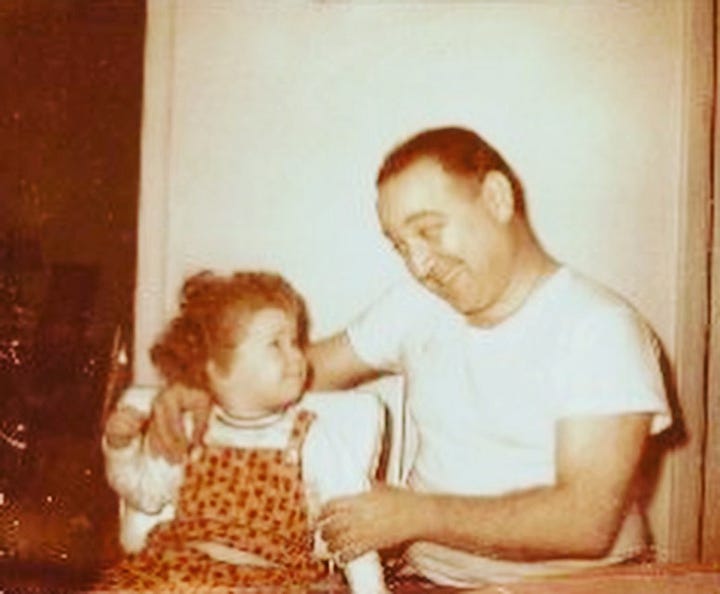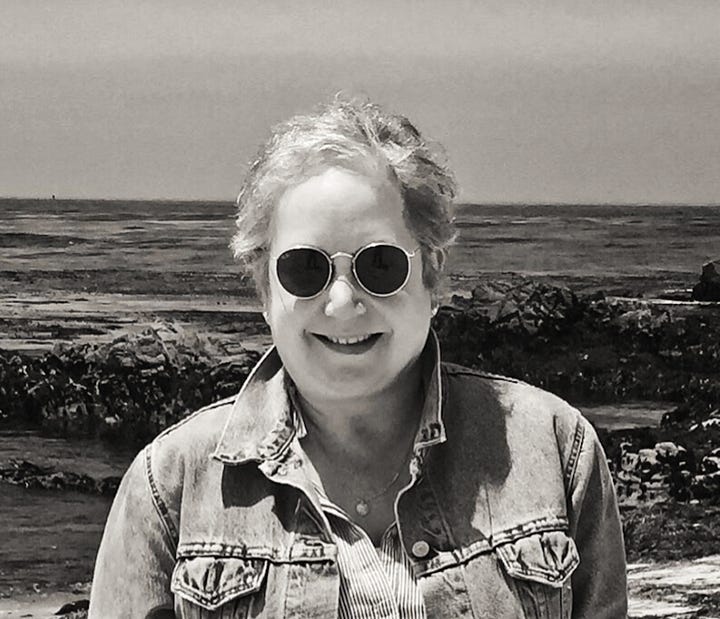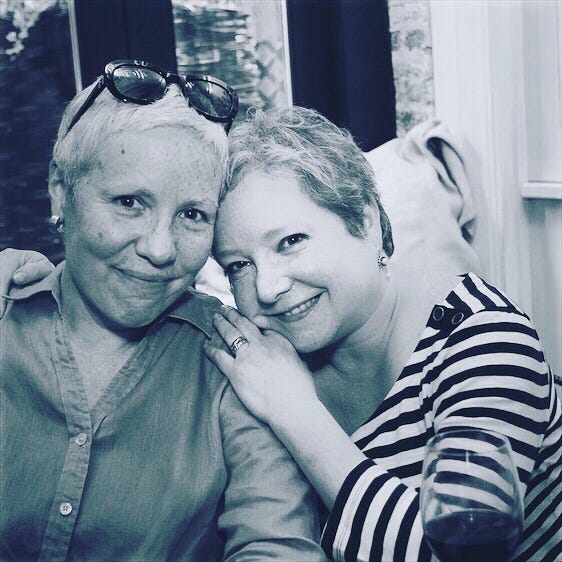This is 60: Author Elissa Altman Responds to The Oldster Magazine Questionnaire
"Having long Covid, I do feel older than I think I should."
From the time I was 10, I’ve been obsessed with what it means to grow older. I’m curious about what it means to others, of all ages, and so I invite them to take “The Oldster Magazine Questionnaire.”
Here, three-time memoirist and Poor Man's Feast newsletter writer responds. -Sari Botton
Elissa Altman is author of the memoirs Motherland, Treyf, Poor Man’s Feast, and the upcoming On Permission. Altman’s work has appeared in Orion, On Being, Narrative, LitHub, O: The Oprah Magazine, Dame, The Guardian, and the Washington Post, where her column, Feeding My Mother, ran for a year. Altman writes and speaks on the intersection of permission and the creative spirit, and teaches the craft of memoir widely, at the Fine Arts Work Center in Provincetown, Maine Media College, Maine Writers & Publishers Alliance, and at the university level. She lives in Connecticut with her wife, book designer and artist Susan Turner.
How old are you?
I was 60 on June 29 but my mother keeps telling everyone I’m 40.
Is there another age you associate with yourself in your mind? If so, what is it? And why, do you think?
I think of myself at three ages: my current age, 60; 35; and my so-called biological age, which is (apparently) 70. My current age is self-explanatory. I think of myself as 35 because that was the age I was when my life and identity finally began to click into place: I had recently come out as a lesbian and was at last living in a somewhat self-actualized manner, given that I was born to a mother who didn’t know she was pregnant with me for six months and with whom I’ve had a longstanding enmeshment problem. I had at that point spent so many years in service to her needs and expectations that I had no idea who I was. At 35, I hit the proverbial fork in the road: I finally considered leaving Manhattan, where I was born and had lived most of my life. I was 36 when I met the woman I would marry, and when I began to publish essays and identify, professionally, as a writer.
I had a Covid-related stroke in 2020 and a Yale neurologist told me that my biological age was ten years beyond my actual age, and that my heart, brain, and liver were those of someone significantly older than I. It was shocking to actually see it in clinical reports where it could no longer be theoretical, and to finally realize that my life was going to have to change if I wanted to stay alive and continue to be productive.
As of this writing, I’ve stopped drinking, which may not seem like much but after years as a food writer it is remarkable, and the number of people who have come out of the woodwork to help me get to this place is inestimable. I’ve stopped many times before—usually connected to a diet, or a dry January—but seeking a life without alcohol is very different and requires a distinct kind of relationship with and to the world, to one’s sense of spiritual possibility, to one’s ideas surrounding boundaries, self-knowledge, and health. It’s no longer a matter of whether I want to enjoy my wine: of course I want to. But if I expect to be here, to heal my brain and my heart, I just can’t. It’s like someone took my glasses off, cleaned them, and handed them back to me.
I think of myself as 35 because that was the age I was when my life and identity finally began to click into place: I had recently come out as a lesbian and was at last living in a somewhat self-actualized manner, given that I was born to a mother who didn’t know she was pregnant with me for six months and with whom I’ve had a longstanding enmeshment problem.
Do you feel old for your age? Young for your age? Just right? Are you in step with your peers?
I have astonishing role models: my aunt, who died in 2020 at 102 years old, played eighteen holes of golf three times a week into her 90s. My wife, also a former athlete who just turned 70, spends hours working hard in the garden, taking the dog on two-mile walks, and is also happy to spend her weekends playing golf. My wife’s New England aunts all lived into their 90s and in some cases, we had to take their extension ladders away. I promised myself that in my 60th year, I’d learn to surf. I’d run a 5k. I’d get back in a pool on a weekly basis. One of my students participated in a super sprint triathlon when she was in her 60s, so there’s hope for me yet.


Having long Covid, I do feel older than I think I should. I was a competitive athlete for many years: a ranked squash player in NYC in my 30s, a ranked tennis player, an avid skier, and game for anything. Stress and chronic illness have resulted in my body not responding the way it used to. My agility isn’t what it was. When I talk with my friends—many of whom are incredibly talented authors who have been working for ages and who are on their seventh, eighth, ninth books—we laugh about perception, and being perceived as older than we are. I taught at a Rutgers writing workshop for Roxane Gay a little while ago; I mentioned graduating from college in 1985 and one of the workshop attendees looked at me as if I’d been alive when dinosaurs roamed the earth.
What do you like about being your age?
I like feeling more comfortable in my own skin, and getting to know myself from a place devoid of the shame and expectation that our culture foists upon women artists. My writing is not for everyone; it tends to be quieter, and that’s fine. It’s as if the glove finally fits.
I have also come to a clear understanding of who my friends are and who they aren’t; this is something that I don’t always like, but that invariably comes with a sense of clarity, truth, and perspective connected to the passage of time. As I’ve gotten older, the number of people closest to me—the people I feel safest with—has shrunk. Maybe it’s just the aging process, or having survived what could have been a catastrophic neurological event, or making the decision to remove alcohol from my life, but I have less and less time for drama. I’ve come to realize that I was often drawn to it among my friends and colleagues because it is what I knew as a child; it was a language I spoke fluently, having grown up with parents who didn’t so much love each other.
I used to have a lot of tolerance for people who continually proved themselves to be antagonistic—I always let them in, and they always hurt me—but I don’t anymore, and I’m comfortable with that, which is not to say that it’s been easy. But to quote my grandmother, if you bang your head against the wall long enough, you eventually learn that it feels better when you stop. At 60, I cherish my friends, both old and new, and the family members who treat each other, and me, with kindness and acceptance. I no longer engage with people who are pugnacious as a way of life, and who like to argue; it’s not interesting or edgy or compelling. It’s just tedious.
I had a Covid-related stroke in 2020 and a Yale neurologist told me that my biological age was ten years beyond my actual age, and that my heart, brain, and liver were those of someone significantly older than I. It was shocking to actually see it in clinical reports where it could no longer be theoretical, and to finally realize that my life was going to have to change if I wanted to stay alive and continue to be productive.
What is difficult about being your age?
The notion that so much time has passed and that I can never get it back is very hard for me. The sense that, if we had had a baby when we first started talking about it, Susan and I would have a kid in college right now, and this brings tears to my eyes whenever I think about it.
The way my body physically responds to exercise and diet has changed, and this is very difficult for me; it appears that I’ve settled like a house. I actually do feel bad about my neck, to mangle Nora Ephron’s words.
The perception among the younger people in my midst that I am somehow less-than is complicated. Professionally, there was a specific moment that I can actually identify, when I began to feel invisible. I spent almost thirty years at a Big Five publisher, and when I turned 55, my professional connections simply vaporized, as though someone opened a trap door beneath me and I fell through, never to be seen or heard from again. Many of my friends and colleagues—all women, all of whom were very successful and who worked at the highest levels—say exactly the same thing, and we just all sort of stare at each other and scratch our heads. As an author, I often forget that I’m perceived as a mature writer, whatever that means, and this directly impacts how one is seen by the marketing and publicity machine, which tends to skew very young.
I also worry about the generation that has grown up entirely in the digital world, and who spend most of their time looking down at a tiny screen rather than into the eyes of those around them. I think that we’re now facing issues of empathy that many of us in my demographic simply haven’t reckoned with before. Combine that with the sense that my body is changing, and I end up making a lot of Soylent Green jokes.
What is surprising about being your age, or different from what you expected, based on what you were told?
My aunt (the one who lived to 102) always said If you eat a chicken sandwich on white bread every day, you’ll live forever. My mother-in-law, who asked my wife and me if we thought she could go out and trim her (eight-foot) hemlocks a few days before she died at almost 95 used to say Garden and you’ll live forever. Neither is true, and the most surprising thing about being my age is the sense that time is finite.
People I love are disappearing or growing ill. It’s like that scene in The Road Runner where Wyle E. Coyote runs straight off a cliff and hangs there in mid-air before noticing that there’s nothing underneath him, he breaks the fourth wall and looks at the audience —uh oh—and down he goes. It often feels like I’m at that place: hanging in mid-air, waiting to fall. And then I look around at my home and my wife and my friends and my family, and they throw me a lifeline and pull me back to safety.
At 60, I cherish my friends, both old and new, and the family members who treat each other, and me, with kindness and acceptance. I no longer engage with people who are pugnacious as a way of life, and who like to argue; it’s not interesting or edgy or compelling. It’s just tedious.
What has aging given you? Taken away from you?
Aging has given me a certain amount of self-confidence and self-assurance that I’ve never had before as a writer and teacher. I have been a longtime musician—I’ve played guitar since I was 4, sometimes professionally, and studied for years with Paul Simon’s brother—but I kept it very quiet because music was my mother’s job, her thing, and it would have been a very complicated place to go. But suddenly, I am playing publicly—a lot—and remembering that this is a primary part of who I am, like eye color or hair texture.
I’m also far more comfortable not having to compare myself to others—as a writer, a woman, a daughter, a friend—than ever before. I’m disinclined to engage with the extremely competitive writers in my midst: I’ve sat on panels where other writers have quoted me to the audience—in front of me—and not attributed the words to me; it used to infuriate me, but now I just laugh. Shortly after my last book, Motherland, came out, a member of my team told me I was too old to be successful and that I’d never write again, two weeks after People Magazine featured the book; normally, I would have believed her, all evidence to the contrary. My gaslighting/bullshit detector has only intensified with age, and I flee from it whereas in the past I would have stuck around, wept, and believed she was right.


Aging has also taken away my formerly endless patience with ignorance in whatever form it comes. I could always make excuses for it and hope that I could effect some sort of change, but I no longer can. Ignorance feels today like an acceptable pretext for hatred, for lack of humanity, cruelty, lack of decency, and I have no time for it anymore.
There are people in this country who would in a breath take away my rights as a tax paying citizen because they find who I am as a lesbian icky, or the fact that I’m Jewish, a problem. There is raging and violent ignorance everywhere, but I was recently exposed to it in a manner that reminded me of the stories my grandmother used to tell me about the 1930s, and it was like Oh….I recognize this…. It was visceral; my genetic memory runs very long and deep. The old cranky liberal in me feels the increasing necessity to keep my heart and mind open to discussions with everyone—my table is long and there are seats for everyone—but the older I get, the less inclined I am to have people in my life who are willfully malicious, in any way.
How has getting older affected your sense of yourself, or your identity?
Over the years, I’ve have spent so much time doing and being so many things—an editor, a longtime musician, a food writer, an author of memoir and a very devoted teacher, a former athlete, a member of the LGBTQ community—that identity was always hard for me to pin down, which of course implies that one’s identity is tied up with what one does, which isn’t always the case. With the passage of time, I feel like who I am has been distilled and clarified. I’ll always be those things, above. But first and foremost, I’m a good wife and a good friend—at least I hope I am—and that feels like enough.
I have been a longtime musician—I’ve played guitar since I was 4, sometimes professionally, and studied for years with Paul Simon’s brother—but I kept it very quiet because music was my mother’s job, her thing, and it would have been a very complicated place to go. But suddenly, I am playing publicly—a lot—and remembering that this is a primary part of who I am, like eye color or hair texture.
What are some age-related milestones you are looking forward to? Or ones you “missed,” and might try to reach later, off-schedule, according to our culture and its expectations?
At 60, my desire to continue my education is as strong as it’s ever been. I went to work for Random House two weeks after I graduated from college, so I never got a terminal degree. It’s a long and convoluted story about parental expectation, money, envy—and while my friends were all going off to Iowa for their MFAs in the 80s, I was home in New York, working as an editor, knowing that I wanted to take another path. It’s something I’ve always regretted, and I still think about it, even though I already teach in some university-level writing programs. If I had my druthers, which I do not, I would lean towards masters’ programs that marry divinity to environmentalism and writing; do they exist? I don’t know.
I would have loved to have had children. It was something we talked and talked about—I thought I had all the time in the world—and then when we made the decision to try, I discovered that I couldn’t; it broke my heart, and when I see Susan with kids (they tend to love and gravitate to her) I know we would have been wonderful parents.
As a milestone, I suppose retirement is something one thinks about as one gets older but I’m probably going to be one of those writers who they find face down in their keyboard; I absolutely cannot fathom not working.
What has been your favorite age so far, and why? Would you go back to this age if you could?
A difficult question. I would say Now. I am in love with my wife of twenty-two years; I love our home. I love that I am able to write and teach for a living. If I had the energy of 30-year-old Elissa, I’d be thrilled.
Is there someone who is older than you, who makes growing older inspiring to you? Who is your aging idol and why?
There have been so many astonishing older women in my life who I’ve looked up to: my late aunt, who lived to be 102, traveled the world, taught French in the New York City public school system for twenty-five years, tragically lost a daughter and a grandson, and kept moving forward—one foot in front of the other. My stepmother, who went back to school in her 40s and got her PhD in psychology, was a tenured professor at Brooklyn College and in private practice, and specialized in trauma; an amazing woman. And women in the public eye who I watch very closely: Patti Smith, Vivian Gornick, Anne Lamott, Alice Elliott Dark, Alice Waters, Twyla Tharp, Deborah Madison.
What aging-related adjustments have you recently made, style-wise, beauty-wise, health-wise?
Significant health issues required that I stop drinking, once and for all. I’ve done it before in fits and starts, but it’s non-negotiable now; it’s only been a little while and I already feel better, my skin and eyes are clearer, and I’m sleeping like the dead.
I’ve long worn no-makeup makeup: I have very light lashes and always have, and brows that are now disappearing, so everything is needing a little help. But a year ago, I decided to only use makeup that was environmentally friendly, chemical-free, not animal-tested, and preferably packaged in materials that are biodegradable (the overabundance of plastics in our lives makes me crazy).
My hair began to thin when I was in my late twenties, and I was diagnosed with stress-related alopecia; it waxes and wanes, and menopause did a serious number on it. I used to travel into Manhattan for mediocre, outrageously expensive hair treatments and cuts, but I am now utterly devoted to Norman James in Kingston, New York, and he is an absolute master who believes in the role of nutrition in hair health.
Other than that, I haven’t worn heels in twenty-five years, and never will again. I’ve always been a Levis 501-and-striped-Breton woman, despite being short, busty, and a bit wide. It’s my uniform, I’m comfortable in it, and I don’t see it changing anytime soon.
I would have loved to have had children. It was something we talked and talked about—I thought I had all the time in the world—and then when we made the decision to try, I discovered that I couldn’t; it broke my heart, and when I see Susan with kids (they tend to love and gravitate to her) I know we would have been wonderful parents.
What’s an aging-related adjustment you refuse to make, and why?
I absolutely do not begrudge any woman her choice to have a facelift, but it’s not for me, at least not now. That said, if I was able to have a breast reduction, I’d be in the operating room at 6 a.m. tomorrow morning. Hauling these disproportionately large ladies through my life at five-foot-one has been exhausting, back-breaking (literally), and just plain heavy. And now they’re heading south. Yay.
What’s your philosophy on celebrating birthdays as an adult? How do you celebrate yours?
I believe that birthdays are meant to be acknowledged by the people we love and who love us back, rather than obligatory, forced celebrations. I am a small-dinner-party person; my wife is not. We’ve met in the middle: I traditionally take her to play golf on her birthday, and then for a great dinner at a place we both love. On my birthday, she usually arranges a day in a small (sometimes private) garden, and a lovely dinner. With every passing year, it is more and more important to me that I spend my birthday near or on the water, which I find healing and life-giving on almost every level.






Elissa, I adore the way you jump off the page every time I read your words. Your voice is clear like a bell. This was pure delight.
This is one of the best essays iI have read in a long time. What a great way to start my morning. I kept thinking through all of it "I wish I had said that," and "yes, my thoughts exactly," even though I am almost eighty. I will be thinking about this all day! And Ill read it again tonight just to make me feel better.